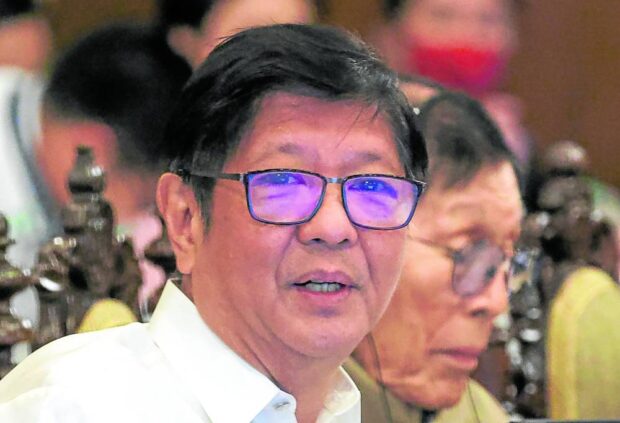Bongbong Marcos tells DOT to review non-operating tourism zones

President Ferdinand R. Marcos Jr. presides during a sectoral meeting in Malacañang Palace on Tuesday, April 18, 2023.(KJ ROSALES/PPA POOL)
MANILA, Philippines — President Ferdinand “Bongbong” Marcos Jr. has ordered the Department of Tourism (DOT) to assess non-operating tourism zones under the Tourism Infrastructure and Enterprise Zone Authority (TIEZA) to boost the Philippine tourism industry.
According to the Presidential Communications Office (PCO), Marcos issued the directive during a meeting with the Private Sector Advisory Council (PSAC) Tourism Sector Group on Thursday in Malacañang.
The PCO said the PSAC presented updates on previous recommendations and new proposals to further improve the country’s tourism sector during the meeting.
“I’m happy that the general direction… that means that we are actually… have already started. There are some very good suggestions,” Marcos said, as quoted by the PCO.
The President, however, noted that TIEZA’s problem seems to be its non-operating properties.
TIEZA is a government-owned and controlled corporation attached to the DOT and is responsible for implementing policies and programs of the DOT pertaining to the development, promotion and supervision of tourism projects in the country.
According to the PCO, the meeting also explored the best ways forward for TIEZA and how to manage its assets.
The PSAC reported that TIEZA’s primary source of funding comes from travel tax collection, which is insufficient to support its project requirements.
Under the Tourism Act of 2009, 50% of travel tax goes to TIEZA, while 40% is allocated to Higher Education Development Fund to enable the CHED to prioritize tourism-related educational programs and courses. The remaining 10 percent goes to the National Commission for Culture and the Arts (NCCA).
As a remedy, PSAC recommended to amend the allocation of Travel Tax to grant more funding for TIEZA and expand the list of priority tourism-related investment activities, among others.
The advisory body’s medium- and long-term recommendations include reviewing, simplifying, and standardizing the privatization or bidding process, leveraging properties to undertake more tourism infrastructure projects, and establishing and issuing a long-term Strategic Tourism Infrastructure/Investment Masterplan.
On the proposal to grant more allocation for TIEZA from the travel tax, the DOT said the move requires amendment to the law, and may not materialize within a year, as eyed by the PSAC.
Responding to the proposal to exclude asset operation from TIEZA’s mandate, the tourism GOCC said such function may be transferred to private partners instead.
The PCO said the Philippines recorded 2.6 million tourist arrivals in 2022, which exceeded the target of 1.7 million.
For this year, the country welcomed 1,138,637 international tourist arrivals as of March 14, or 24 percent of the 4.8 million target for the year.
The PSAC is composed of business leaders and industry experts who provide technical advice to the President in achieving the government’s economic objectives, particularly in six key sectors such as agriculture; digital infrastructure; healthcare; infrastructure; jobs generation; and tourism.
RELATED STORIES:
Tourism a ‘driver’ to economy transformation – Marcos
Marcos Jr. vows gov’t support for pandemic-stricken tourism industry